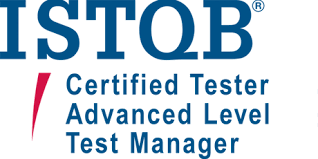 Sell tickets and manage registrations
Sell tickets and manage registrations
 View my tickets and registrations
View my tickets and registrations
 Sell more tickets through digital marketing
Sell more tickets through digital marketing
 Add an event calendar to your website
Add an event calendar to your website
 Find events by location and categories
Find events by location and categories
ISTQB Advanced – Test Manager 5 Days Training in Ottawa

Course Description :
This Advanced Level Course builds on the knowledge and skills acquired at the Foundation Level. In this Course, you will learn how to manage a testing project by implementing the mission, Goals, and testing Processes established for your organization. Major skills acquired through this Course are:
- Organize and lead Risk identification and Risk analysis sessions and use the results of these sessions for test estimation, planning, monitoring, and control
- Propose a business case, outlining the costs and benefits expected, for test activities.
- Create and implement test plans consistent with your organization’s test Policies and test strategies
- Ensure proper communication within the test team and with other project stakeholders and to participate in and lead test Process improvement initiatives
- Identify skills and resource gaps in your test team, be able to participate in sourcing adequate resources and identify and plan skills development within your team
Holding the ISTQB Advanced Level Test Manager Certificate entitles you to use the Certified Tester Advanced Level acronym CTAL-TM and to go on to a subset of the higher Expert-Level software testing certifications.
Course Outline :
Testing Process- Test Planning, Monitoring, and Control
- Test Planning
- Test Monitoring and Control
- Test Analysis
- Test Design
- Test Implementation
- Test Execution
- Evaluating Exit Criteria and Reporting
- Test Closure Activities
- Understanding Testing Stakeholders
- Lifecycle Activities and Work Products
- Alignment of Test Activities with Other Lifecycle Activities
- Managing Non-Functional Testing
- Managing Experience-Based Testing
- Risk-Based Testing
- Risk-Based Testing Techniques
- Other Techniques for Test Selection
- Test Prioritisation and Effort Allocation in the Test Process
- Test Policy
- Test Strategy
- Master Test Plan
- Level Test Plan
- Project Risk Management
- Other Test Work Products
- Test Estimation
- Defining and Using Test Metrics
- Defining and Using Test Metrics
- Business Value of Testing
- Business Value of Testing
- Distributed, Outsourced, and Insourced Testing
- Managing the Application of Industry Standards
- Managing the Application of Industry Standards
- Management Reviews and Audits
- Managing Reviews
- Metrics for Reviews
- Managing Formal Reviews
- The Defect Lifecycle and the Software Development Lifecycle
- Defect Report Information
- Assessing Process Capability with Defect Reporting Information
- Test Improvement Process
- Improving the Testing Process
- Improving the Testing Process with TMMi
- Improving the Testing Process with TPI Next
- Improving the Testing Process with CTP
- Improving the Testing Process with STEP
- Tool Selection
- Tool Lifecycle
- Tool Metrics
- Individual Skills
- Test Team Dynamics
- Fitting Testing Within an Organisation
- Motivation
- Communication
Target Audience :
Software Developers and Analysts
Learning Objectives :
- Use traceability to check completeness and consistency of defined test conditions with respect to the test Objectives, test strategy, and test plan.
- Use traceability to check completeness and consistency of designed test cases with respect to the defined test conditions.
- Use Risks, prioritization, test environment and data dependencies, and constraints to develop a test execution schedule, which is complete and consistent with respect to the test Objectives, test strategy, and test plan.
- Use traceability to monitor test progress for completeness and consistency with the test Objectives, test strategy, and test plan.
- Implement a project retrospective to evaluate Processes and discover areas to improve.
- Analyze the stakeholders, circumstances, and needs of a software project or program, including the software development lifecycle model, and identify the optimal test activities.
- Analyze, identify, and assess product quality Risks, summarizing the Risks and their assessed level of Risk based on key project stakeholder perspectives.
- Analyze given samples of test Policies and test strategies, and create master test plans, level test plans, and other test work products that are complete and consistent with these documents.
- For a given project, analyse project Risks and select appropriate Risk Management options (i.e., mitigation, contingency, transference, and/or acceptance).
- Define documentation norms and templates for test work products that will fit organisation, lifecycle, and project needs, adapting available templates from standards bodies where applicable.
- For a given project, create an estimate for all test Process activities, using all applicable estimation techniques.
- Analyze and report test results in terms of the residual Risk, defect status, test execution status, test coverage status, and confidence to provide insight and recommendations that enable project stakeholders to make release decisions.
- Estimate the value of testing based on cost of quality, along with other quantitative and qualitative considerations, and communicate the estimated value to testing stakeholders.
- Analyze a project to select the appropriate review type, and to define a plan for conducting reviews, in order to ensure proper execution, follow up, and accountability.
- Define Process and product metrics to be used in reviews.
- Develop a defect Management Process for a testing organisation, including a defect report workflow that can be used to monitor and control a project's defects throughout the testing lifecycle.
- Define the data and classification information that should be gathered during the defect Management Process.
- Define a test Process improvement plan using the IDEAL model.
- Assess a given situation in order to devise a plan for tool selection, including Risks, costs, and benefits.
- Using a skills Assesmentspreadsheet, analyse the strengths and weaknesses of team members related to use of software systems, domain and business knowledge, areas of systems development, software testing, and interpersonal skills.
Course Agenda :
Day 1- Testing Process
- Test Management in Context
- Risk-Based Testing and Other Approaches
- Test Documentation and Other Work Products
- Test Estimation
- Defining and Using Test Metrics
- Business Value of Testing
- Distributed, Outsources, and Insourced Testing
- Managing the Application of Industry Standards
- Reviews
- Defect Management
- Improving the Testing Process
- Test Tools and Automation
- People Skills – Team Composition
- Exam

